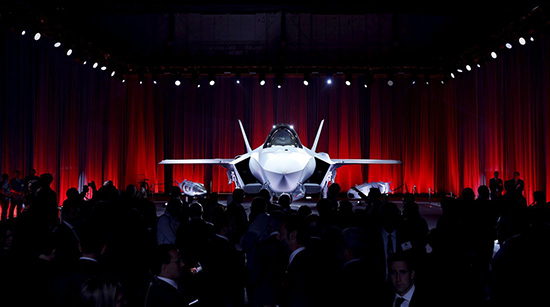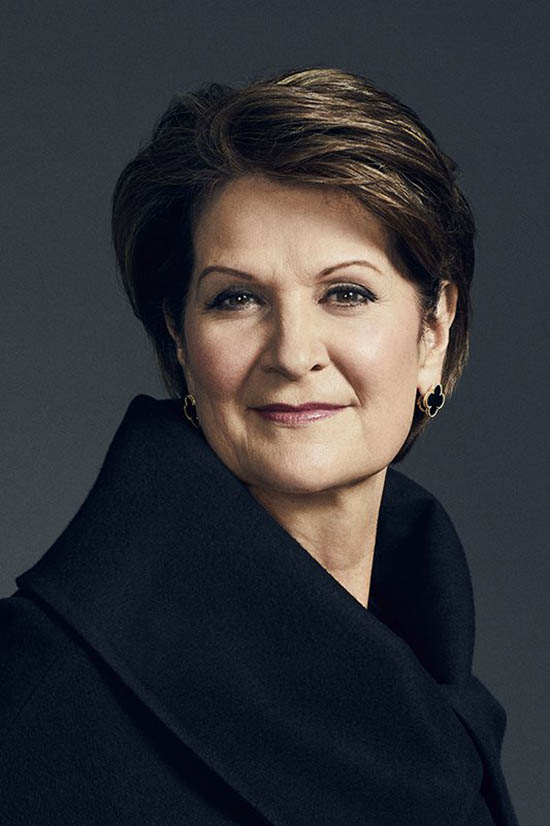這三位女性正締造著美國的軍事力量
|
“最后一個(gè)男人,?!比A爾街最近給美國五大軍火商之一雷神公司的董事長兼首席執(zhí)行官湯姆·肯尼迪起了這個(gè)綽號。畢竟,,在五家美國軍火巨無霸的領(lǐng)導(dǎo)者中,,他已是唯一一位沒有入選《財(cái)富》最具影響力的商界女性排行榜的高管,。對此肯尼迪表示:“我為本行業(yè)感到無比自豪?!?/p> 今年7月,,另一軍火巨頭諾斯洛普格拉曼公司宣布,首席執(zhí)行官韋斯·布什將在今年年末卸任,,現(xiàn)任首席運(yùn)營官的凱西·沃登將接任,,成為這家公司歷史史上的首位女性首席執(zhí)行官。和其他三位女性——洛克希德·馬丁的首席執(zhí)行官瑪麗蓮·休森,、通用動(dòng)力的首席執(zhí)行官菲比·諾瓦科維奇、波音公司旗下的防務(wù),、航天與安全業(yè)務(wù)的總裁兼首席執(zhí)行官利安妮·卡雷特一樣,,沃登也將由此躋身美國國防承包商的精英俱樂部。去年,,這四位女性高管領(lǐng)導(dǎo)的公司合計(jì)斬獲高達(dá)1100億美元的國防相關(guān)收入,。 沃登的擢升在企業(yè)界引起了轟動(dòng)。國防與航天領(lǐng)域曾經(jīng)是男性高管的天下,,而在管理層多元化的宣傳攻勢下,,短短幾年工夫,女性就勢如破竹,,突破了職場天花板,,無論是晉升速度之快還是職位之高,該行業(yè)女性高管的表現(xiàn)都遠(yuǎn)超大多數(shù)《財(cái)富》美國500強(qiáng)公司里的同行,。最近剛同意被競爭對手SAIC收購的軍用信息技術(shù)和網(wǎng)絡(luò)安全公司Engility也有一位女性首席執(zhí)行官——林恩·杜格勒,。她認(rèn)為:“沒有必要強(qiáng)調(diào)男性和女性,實(shí)際上是有能者居之,?!?/p> 據(jù)美國民調(diào)與智庫機(jī)構(gòu)皮尤研究中心統(tǒng)計(jì),在標(biāo)普1500成分股公司中,,女性首席執(zhí)行官僅占5%,,而國防與航天行業(yè)的女性首席執(zhí)行官卻在該行業(yè)頂層高管中占將近19%。若論起同政府和軍方的合作關(guān)系,,沒有哪個(gè)領(lǐng)域的企業(yè)比國防的更密切,,這可能是該行業(yè)更接近實(shí)現(xiàn)性別平等的一個(gè)原因。企業(yè)高管獵頭公司Heidrick & Struggles的航天,、國防與航空領(lǐng)域負(fù)責(zé)人帕特里克·格雷指出,,美國軍方在刻意擴(kuò)大女性的影響力,從上世紀(jì)90年代開始,,美國陸??杖姵霈F(xiàn)了一批女將軍,,“國防業(yè)已經(jīng)認(rèn)識(shí)到,應(yīng)該跟隨客戶的變化趨勢,?!丙溈襄a高級合伙人拉雷娜·伊認(rèn)為:“越來越多女性躋身公司最高層,甚至首席執(zhí)行官,,這并非偶然,。” |
“THE LAST MAN STANDING.” That’s what some on Wall Street have recently nicknamed Tom Kennedy, the chairman and CEO of Raytheon. After all, he’s the only leader of a top five U.S. defense business who isn’t on Fortune’s Most Powerful Women list—and for that fact, says Kennedy, “I couldn’t be prouder of our industry.” This July, Northrop Grumman announced that CEO Wes Bush would step down at the end of the year and be replaced by the first woman to hold that office, current COO Kathy Warden. She will join an elite club of defense contractor CEOs that includes Lockheed Martin’s Marillyn Hewson, General Dynamics’ Phebe Novakovic, and Leanne Caret, who heads Boeing’s defense, space, and security division. Together, their companies generated a staggering $110 billion in defense-related revenue last year. Warden’s promotion made waves across the corporate world, where diversity advocates marveled at the way the once male-dominated defense and aerospace industry had, in a few short years, blown up its own glass ceiling, elevating women higher and faster than most of the Fortune 500. “It isn’t a male-female thing, necessarily, but really just acknowledging that talent won,” says Lynn Dugle, CEO of military IT and cybersecurity firm Engility, which recently agreed to be acquired by rival contractor SAIC. In the S&P 1500, women account for nearly 19% of the CEOs in aerospace and defense, accord-ing to the Pew Research Center, compared with just 5% across all companies. No sector works more closely with the government and military than defense, which may be one reason it’s closer to gender equality. With the armed forces making deliberate efforts to expand women’s roles and the emergence of a generation of female generals as well as Air Force and Navy secretaries beginning in the ’90s, “the defense industry has realized they need to mirror their customers,” says Patrick Gray, the aerospace, defense, and aviation practice leader at executive search firm Heidrick & Struggles. A decade ago, the companies redoubled their efforts. “It’s not an accident … that they’ve become C-suite or a CEO,” says Lareina Yee, a senior partner at McKinsey. |

|
對于國防業(yè)的領(lǐng)導(dǎo)層轉(zhuǎn)變,,體會(huì)最深的莫過于琳達(dá)·赫德森。2009年,,她就任BAE系統(tǒng)公司的首席執(zhí)行官,,成為業(yè)內(nèi)首名任這一職位的女性。她的職業(yè)生涯始于1972年,,當(dāng)時(shí)周圍都是男同事,。赫德森回憶道:“我需要他們忘記我是女人?!彼f等到職業(yè)后期,,“身為女性某種程度上成了一種優(yōu)勢,女性已經(jīng)可以沖破重重困境,?!?/p> 在戰(zhàn)場上,美國穩(wěn)操勝券,,國防行業(yè)的女性也打算保持佳績,。盡管要爭搶政府的國防預(yù)算蛋糕,但高管們都表示各家公司肩負(fù)著同樣的保家衛(wèi)國責(zé)任,。正如卡雷特所說:“目標(biāo)就是確保戰(zhàn)爭不公平,,優(yōu)勢要在我們這邊?!?/p> 然而,,現(xiàn)在要保持美國的軍事實(shí)力和技術(shù)水平都處于領(lǐng)先地位絕非易事。美國與中俄兩個(gè)超級大國的關(guān)系愈發(fā)緊張,,中俄的技術(shù)水平提高速度越來越讓美國擔(dān)心,。在國際上,被美國稱為流氓國家的朝鮮和伊朗已擁有核武器,,一些極端主義集團(tuán)的信徒還在繼續(xù)暴行,。即使在地球大氣層之外,,也有不容小覷的實(shí)體和網(wǎng)絡(luò)攻擊威脅。另外,,某些國家的領(lǐng)導(dǎo)人有可能拋棄反化學(xué)武器和種族滅絕的相關(guān)國際法,。“年復(fù)一年,,形勢越加嚴(yán)峻,。”休森在談到地緣政治風(fēng)險(xiǎn)時(shí)說道,。 種種擔(dān)籠罩美國政界,。共和黨人領(lǐng)導(dǎo)的美國國會(huì)已經(jīng)將2018財(cái)年的國防部預(yù)算上調(diào)約15%,增至7000億美元,,民主黨對此表示支持,。而暴脾氣的最高領(lǐng)導(dǎo)人——美國總統(tǒng)特朗普更是明確支持國防。他曾直接宣布對國家安全領(lǐng)域的期待,,在推特上發(fā)帖稱要降低洛克希德·馬丁的F-35生產(chǎn)成本,還表示要用“智能”導(dǎo)彈向敘利亞開火,。國防企業(yè)的高管們認(rèn)為,,從外部環(huán)境來看當(dāng)前是從業(yè)以來行業(yè)環(huán)境最佳的時(shí)期?!霸炀瓦@場完美風(fēng)暴的是,,我們對國防領(lǐng)域的發(fā)展前景達(dá)成了共識(shí)?!倍鸥窭杖缡钦f,。 如此背景下,女性首席執(zhí)行官也擁有大展才華的機(jī)會(huì),。以休森為例,。自她2013年執(zhí)掌洛克希德·馬丁以來,公司的股票回報(bào)率達(dá)到338%,??傮w而言,特朗普當(dāng)選以來,,航天和國防類股一路高漲,,漲幅較大盤高出29個(gè)百分點(diǎn)。三場采訪中,,休森,、卡雷特和杜格勒都探討了在高風(fēng)險(xiǎn)環(huán)境下如何領(lǐng)導(dǎo)企業(yè)。(沃登和諾瓦科維奇拒絕接受采訪,。)以下是她們的看法,,因篇幅有限也為表述清晰,,內(nèi)容略經(jīng)編輯。 |
No one felt the shift more viscerally than Linda Hudson, who in 2009 became CEO of BAE Sys-tems and the industry’s first female leader. When she launched her career surrounded by male colleagues, in 1972, “I needed them to forget I was female,” she recalls. By the end of her career, she says, “being female had somewhat turned into an advantage—that you had risen against all odds.” On the battlefield, the U.S. has the odds on its side—and these women plan to keep it that way. Even as they compete for government budget dollars, the executives say they share a duty to the United States: “To ensure that there is an unfair fight—unfair in our favor,” as Caret puts it. Yet maintaining this country’s lead in military might and technology has never been more difficult. There is rising unease in U.S. relations with superpowers Russia and China, whose technical prowess is increasing at a breakneck pace. Add to that the nuclear capabilities of rogue states including North Korea and Iran, and continuing atrocities by acolytes of extremist factions. There are credible threats of attacks (physical and cyber) even beyond Earth’s atmosphere. And heads of state have shown a willingness to disregard international law on chemical warfare and genocide. “Every year it seems to get even more dramatic,” Hewson says of the geopolitical risk climate. Those fears have resounded in Washington, D.C., where a Republican-led Congress granted the Pentagon a budget increase of more than 15%—to $700 billion for fiscal 2018—with vocal sup-port from the other side of the aisle. It hasn’t hurt to have a hot-tempered Commander-in-Chief who has been direct about announcing what he wants on the national security front, whether it’s cost reductions on Lockheed’s F-35 fighter jet or “smart” missiles to fire on Syria (both expressed via tweets). All told, executives describe what may be the best industry climate of their careers. “What makes this the perfect storm is that we really do have consensus around what needs to happen in our defense space,” says Dugle. Against that backdrop, the female CEOs have had a chance to shine. Since Hewson took over Lockheed Martin in 2013, for example, the stock has returned 338%. Overall, since President Trump’s election, aerospace and defense stocks have outperformed the market by 29 percentage points. In separate interviews, Hewson, Caret, and Dugle discussed leadership when the stakes are the highest. (Warden and Novakovic declined to participate.) What follows is in their words, edited for length and clarity. |
|
開路先鋒 |
Trailblazing |

|
我和通用動(dòng)力的菲比·諾瓦科維奇在2013年的同一天擔(dān)任首席執(zhí)行官。我們是好朋友,,曾聊過作為公司史上首位女性領(lǐng)導(dǎo)者第一天上任的感覺,。剛開始我覺得,“不想讓人感覺得到這個(gè)職位只因?yàn)槲沂桥??!蔽蚁M蠹艺J(rèn)識(shí)到,取得這樣的成績是因?yàn)楣窘o我們機(jī)會(huì)學(xué)習(xí),、成長,,變得強(qiáng)大,在工作中展現(xiàn)我們的能力,。通過種種努力,,最終我們可以成為公司最高層。 不過,,我和菲比也討論了我們成為模范榜樣的問題,。這是我們應(yīng)該認(rèn)真對待的事,因?yàn)槟軉l(fā)和激勵(lì)其他女性,,像在告訴她們:“我也可以做那樣的工作,。” 我還記得,,剛?cè)肼殘鰰r(shí),,我不是很確定自己有沒有為謀求事業(yè)進(jìn)步做好準(zhǔn)備,。沒過多久,我開始為洛克希德·馬丁效力,公司把我列為一個(gè)專門的一般管理層計(jì)劃人選,,讓我真正走上了職業(yè)進(jìn)取之路。現(xiàn)在想來真不可思議,,那可是三十年前,,這家公司就意識(shí)到要投入培養(yǎng)人才。對員工個(gè)人來說,,只需要好好表現(xiàn),、把握這些機(jī)會(huì)就夠了,。所以,當(dāng)董事會(huì)讓我執(zhí)掌洛克希德·馬丁經(jīng)營大權(quán)時(shí),,可以說:“我準(zhǔn)備好了,?!?/p> 看看凱西(沃登)、利安妮(卡雷特)和我們行業(yè)的其他女高管,,你會(huì)發(fā)現(xiàn),,關(guān)鍵是她們能得到和男性一樣的經(jīng)驗(yàn)。米歇爾·埃文思是我們剛剛?cè)蚊囊晃慌愿吖?,她將領(lǐng)導(dǎo)公司210億美元規(guī)模的航空業(yè)務(wù),,以及我們最大的F-35項(xiàng)目。已經(jīng)在洛克希德·馬丁工作多年的她,,有著豐富的經(jīng)驗(yàn),對業(yè)務(wù)盈虧負(fù)有責(zé)任感,,得到這一職位不算意外,。我認(rèn)為,,不管是男性還是女性,,這些都是擔(dān)任首席執(zhí)行官需要具備的,。 |
Phebe Novakovic at General Dynamics and I started as CEOs on the same day in 2013. Phebe and I are good friends and have talked about what it’s like on day one as the first female leader of our companies. And early on, I kind of felt like, “Well, gee, I don’t want to be recognized that I achieved this just because of my gender.” I just wanted to be recognized that I achieved that through being in a company that gives us opportunities to learn and grow and be strong and demonstrate our capabilities in our performance. And through those results, ultimately we can achieve the most senior position in the company. However, both Phebe and I discuss that we are role models. And that’s something that we should take very seriously because it inspires and motivates other women to say, “I can be in that job.” I can think back at times early in my career when I wasn’t quite sure if I was ready for something. Soon after I started at Lockheed Martin they put me on a special general management development plan, and that is what really got me on a path. And I think back, gosh, over 30 years ago, this company recognized that you invest in talent. It’s up to the individual to perform, to accept those opportunities. So when the board offered me the position of running Lockheed Martin, I said, “I’m ready.” When you look at Kathy [Warden] and Leanne [Caret] and others in our industry, it’s really a matter of them getting the experiences just like a male would get. We just named a woman, Michele Evans, to lead our $21 billion aeronautics business and the largest program that we have, the F-35. But she didn’t get there by accident. She got there because she has developed a long career at Lockheed Martin and gotten a lot of different experiences. She’s had profit and loss responsibility. And all of those things I think are what you look for, whether it’s a man or a woman, to take over as CEO. |

|
實(shí)際上,有人曾告訴我,我永遠(yuǎn)不會(huì)做管理層。我的二級主管說,我太愛笑,要么大笑要么微笑,。可我的直接上級不同意那位主管的看法,他說:“我們需要讓你去擔(dān)任和現(xiàn)在不同的職位,因?yàn)橐遣荒敲醋?,你就不?huì)成為我預(yù)計(jì)你能變成的那種人,。”這是要明確公司會(huì)為所有人創(chuàng)造機(jī)會(huì),,不單是對男性,,對作為少數(shù)群體的女性也是如此。 不過,,我從來沒有期待自己會(huì)做到今天這個(gè)位子,。當(dāng)時(shí)我在和我們的董事長丹尼斯·米倫伯格以及人力資源主管開會(huì),突然之間,,丹尼斯說:“嘿,,利安妮,你能不能再待久一點(diǎn),,我要和你談?wù)?。”然后,,他們就關(guān)上門,我忍不住叫起來:“天啊,,你是要炒了我吧,?!钡つ崴箙s這樣回應(yīng):“什么?我是想讓你做這個(gè)(工作),?!?/p> |
I was actually told I would never make management. My second level supervisor said I laughed too much, I smiled too much. But my immediate boss disagreed with his boss, and he said, “We need to get you to a different position because you’re not going to be who I think you can be if we don’t get you somewhere else.” It’s about making certain that we’re creating opportunities for everyone—for women, for minorities, for men. But I never had any expectation I would be in this office. I was in a meeting with our chairman, Dennis Muilenburg, and the head of our HR, and all of a sudden, Dennis goes, “Hey, Leanne, can you just stay a little bit longer because I need to talk to you.” And they’re shutting the door, and I blurted out, “Oh, my God, you’re firing me.” And Dennis is like, “What? No. I want you to do this [job].” |

|
我是我家里第一個(gè)上大學(xué)的女性,。25年前,甚至15年前我都不敢想未來有一天在洛克希德·馬丁,、諾斯洛普格拉曼公司和通用動(dòng)力之類公司會(huì)出現(xiàn)女性領(lǐng)導(dǎo)人,。個(gè)人職業(yè)生涯中,我告訴自己很多次“不可能,?!蔽矣浀煤髞淼睦习孱I(lǐng)我進(jìn)入雷神公司時(shí)問我,愿不愿意當(dāng)其中一家公司的總裁,?我的回答是,,“哦,天吶,,你應(yīng)該考慮X,、Y和Z。他們更有資格,?!焙髞砦腋嬖V一位好友說這件事,她說,,“這是我聽過最愚蠢的事,,以后再別提了。你真是一個(gè)壞榜樣,?!彼晕艺娴暮苄疫\(yùn),人們給了我很多超乎預(yù)料的好機(jī)會(huì),。 我很擔(dān)心國家的敵人,,把其中幾個(gè)大國人口加起來就會(huì)發(fā)現(xiàn),美國明顯處于劣勢,。所以對我來說,,性別多樣性是國家安全問題。如果國家能利用好每個(gè)人才,,對大家都有益,。 對女性來說,去沙特阿拉伯挑戰(zhàn)更大,,沙特與美國的國防公司達(dá)成了數(shù)十億美元的交易,。我在沙特就犯過不少新手級錯(cuò)誤,。新手犯錯(cuò)案例1:門打開就進(jìn)電梯。錯(cuò),!男性跟女性要乘坐不同的電梯,。新手犯錯(cuò)案例2:喝咖啡太多,因?yàn)闆]有女性洗手間,。新手犯錯(cuò)案例3:安檢時(shí)跟著隊(duì)伍排隊(duì),。一般都是男性的隊(duì)伍,旁邊才是女性專門的排隊(duì)區(qū)域,。 休森:我在沙特住過不短時(shí)間,。我穿著長袍,臉上圍著莎依拉,,尊重當(dāng)?shù)貍鹘y(tǒng),,尤其是女性的著裝習(xí)慣。但除此之外,,我并未因女性身份受到特別對待,,跟其他國家高級政府官員接待我的方式差不多。 特朗普時(shí)代的國防 休森:我經(jīng)常旅行,,跟世界各國領(lǐng)導(dǎo)人會(huì)面,,經(jīng)常聽說地緣政治充滿不確定性和波動(dòng)性的嚴(yán)重性。地緣政治并不平衡,,跨越各大洲,,而且威脅正持續(xù)加速,很讓人擔(dān)心,。老實(shí)說,,威脅涉及所有領(lǐng)域,空中,、陸地,、太空,還有網(wǎng)絡(luò),。與俄羅斯,、非政府團(tuán)體和恐怖分子都有關(guān)。因此,,繼續(xù)保持并提升技術(shù)優(yōu)勢至關(guān)重要,。我們的對手或潛在對手都在迅速發(fā)展。 杜格勒:兩黨領(lǐng)導(dǎo)人都意識(shí)到,,目前戰(zhàn)備情況和一些技術(shù)面臨前所未有的威脅,,尤其太空方面。現(xiàn)在可沒有數(shù)十年時(shí)間供我們發(fā)展技術(shù),,積攢經(jīng)驗(yàn)和實(shí)踐,,所以在太空和網(wǎng)絡(luò)方面存在很多未知數(shù),。政府提供了超越對手的最好潛在機(jī)會(huì),但更可能是巨大的挑戰(zhàn),。國會(huì)議員積極批準(zhǔn)了十年來最大的預(yù)算后,現(xiàn)在可能是全行業(yè)最激動(dòng)人心的時(shí)刻,。 卡雷特:現(xiàn)任政府不管是對話的態(tài)度,,還是向業(yè)界傳輸觀念都很特別。他們非常坦誠,,有時(shí)話不一定好聽,,但對達(dá)成更進(jìn)一步合作很重要。 空間戰(zhàn)爭 卡雷特:很多人都沒有意識(shí)到空間對當(dāng)代人生活的重要性,。但如果沒有太空中的衛(wèi)星,,手機(jī)里的GPS功能就會(huì)作廢。所以看到人們終于開始理解世界多么大之后,,我很高興,。 杜格勒:多年來人們一直在爭論:太空是戰(zhàn)爭的一部分嗎?其實(shí)很荒謬,。因?yàn)榈孛鎽?zhàn)爭是由空間驅(qū)動(dòng)的,。想想衛(wèi)星通信,有了定位我們才知道軍隊(duì)在哪里,,移動(dòng)方向以及實(shí)現(xiàn)溝通,。還有GPS和精準(zhǔn)導(dǎo)航,如果想瞄準(zhǔn)某處,,首先得知道具體位置在哪,。因此,如果對手摧毀空間設(shè)備,,地面部隊(duì)也會(huì)癱瘓,。受影響的不僅是軍事或戰(zhàn)爭,銀行交易也會(huì)使用GPS技術(shù),。因此,,如果系統(tǒng)受到某種攻擊,銀行業(yè)也會(huì)崩潰,。 休森:導(dǎo)彈預(yù)警等功能背后都是衛(wèi)星支持,。看看9月中旬的佛羅倫薩颶風(fēng)就能明白,。今年,,我們根據(jù)美國國家海洋和大氣管理局的推薦推出了最先進(jìn)的氣象衛(wèi)星,捕捉的畫面簡直像從黑白電視一步進(jìn)化到高清大屏幕電視,,甚至能繪制閃電信息,。這顆衛(wèi)星對拯救生命作用很大,,因?yàn)樵跉夂颥F(xiàn)象和颶風(fēng)形成早期即可預(yù)測。 保持領(lǐng)先地位 休森:我們正研究的一個(gè)重要領(lǐng)域是超音速,,可以超過5馬赫,,即超過聲速5倍,包括武器也包括飛機(jī)或宇宙飛船之類,。美國之外的其他國家也在該領(lǐng)域迅速崛起,,保持領(lǐng)先地位很重要,所以我們在投入大量資金,,美國國防部也是,。如果知道其他人在投資研究高超音速武器,就得確保能實(shí)現(xiàn)防御,。定向能量或激光武器系統(tǒng)非常重要,。這類武器不需要傳統(tǒng)的彈藥補(bǔ)給,成本更低,,而且更有效率,。我們還有所謂的碰撞擊殺技術(shù),類似用子彈擊中子彈,。目標(biāo)是在導(dǎo)彈落地甚至破片之前就能擊中并實(shí)現(xiàn)驅(qū)散,。 自動(dòng)駕駛非常重要。不幸的是,,阿富汗和伊拉克的簡易爆炸裝置對駕駛卡車(提供補(bǔ)給)的人們危害非常大,。因此,我們團(tuán)隊(duì)找了一架之前用于運(yùn)送木料上山的直升機(jī),,把它改裝為自動(dòng)駕駛系統(tǒng),,后來運(yùn)送了價(jià)值耗資數(shù)百萬英鎊的補(bǔ)給。誰能算出因?yàn)闊o人駕駛挽救了多少人的生命,? 卡雷特:有一艘55英尺長的潛水艇在水下待命,,不需要駕駛就能實(shí)現(xiàn)自動(dòng)部署。我們深信也希望達(dá)到的目標(biāo)是,,自動(dòng)空中交通會(huì)變成日常生活一部分,。波音將走在行業(yè)前列。在我看來,,某天人們肯定會(huì)鉆進(jìn)各自的小車艙,,然后開始行程。 杜格勒:技術(shù)發(fā)展的速度可能是好事,,也可能是壞事:如果我們是行動(dòng)最快的,,比如在其他國家之前實(shí)現(xiàn)量子計(jì)算,當(dāng)然很好。如果進(jìn)展不順,,就不太妙,。 911事件發(fā)生并不是因?yàn)槌霈F(xiàn)全新的技術(shù),而是因?yàn)榻俜藢w機(jī)變成了武器,。我認(rèn)為靠著當(dāng)前的技術(shù)和處理能力,,詳盡分析公開信息,從動(dòng)態(tài)視頻到每個(gè)擁有電話發(fā)射信號的人,,想了解正在發(fā)生的事會(huì)更容易,。我相信英特爾社區(qū)每天都在努力。舉個(gè)很明顯的例子,,現(xiàn)在人們可以利用社交媒體數(shù)據(jù)上疊加分析層并掌握輿情。在阿拉伯之春事件時(shí),,通過技術(shù)就可以提前知道,。我們可以利用預(yù)知的優(yōu)勢保護(hù)國家安定。當(dāng)然了,,所有進(jìn)步都要付出代價(jià),,隱私權(quán)仍然要高度重視。 休森:希望跟我們合作的政府行事正當(dāng),。我也相信行業(yè)在努力保證國家安全,。事實(shí)證明,之后并未出現(xiàn)類似911的事件,。美國在國防和軍事領(lǐng)域仍是領(lǐng)導(dǎo)者,,而且還將繼續(xù)保持。關(guān)鍵在于要繼續(xù)投資國防,,確保隨著技術(shù)的發(fā)展始終處于最前沿,。(財(cái)富中文網(wǎng)) 本文的另一個(gè)版本發(fā)表于2018年10月1日出版的《財(cái)富》雜志上,為“最具影響力的商界女性”系列報(bào)道的一部分,,標(biāo)題為《力量的展示》,。 譯者:Ms |
I was the first woman in my family to go to college. And I would have never surmised 25 or even 15 years ago that you’d have women leading a Lockheed Martin, a Northrop Grumman, a General Dynamics. In my own career, many times I told myself “no.” I remember when the person who was going to be my boss brought me in at Raytheon and said, Would you like to be considered for the president of one of our businesses? And my response was, “Oh, gosh, I think you should think about Person X and Y and Z. They’re much more qualified.” And I later told a dear friend I had done that, and she said to me, “That is not only the stupidest thing I have ever heard, don’t ever tell that story again. You’re being a terrible role model.” So I was really fortunate that people gave me probably more opportunity than I was ready for. I worry a lot with nation-state adversaries—if you just add up [the populations of ] a few of those big players, we’re outmanned. So to me, [gender diversity] is a national security issue. Our country benefits by utilizing every talent, every individual. One place it is more challenging for women is Saudi Arabia, which has billions of dollars in deals with U.S. defense companies. I’ve been [there], and my advice to female colleagues traveling there is, don’t make rookie mistakes. Rookie mistake No. 1 is getting in the elevator when the doors open. No. Men and women ride in separate elevators. Rookie mistake No. 2: drinking too much coffee—no women’s restrooms. Rookie mistake No. 3: getting in the line when it’s time to go through security. That’s the men’s line. There’s a women’s area off to the side. HEWSON: I spend a lot of time in the Kingdom. I wear an abaya and a shayla and honor the traditions that they have, particularly in women’s dress. But beyond that, I was never treated any differently as a female or differently than I would be by any other senior government official around the world. Defense in the Trump Era HEWSON: I travel a lot, meeting with world leaders, and what I hear is how significant the geopolitical environment is in terms of its unpredictability, its volatility. It’s asymmetrical; it’s intercontinental—the threats are just continuing to accelerate, and there’s a big concern. It’s across all domains, frankly—air, land, space, cyber. Russia and actors and terrorists. So it’s critically important to maintain and continue to advance our technological superiority. Our adversaries or potential adversaries are progressing very quickly. DUGLE: Leaders on the Hill from both parties realize that our readiness and some of our tech-nology, certainly in space, were being contested in a way we hadn’t seen. There are more un-known variables in the equation with space and cyber because we don’t have decades of training technique, experience, exercise. I think they offer the biggest potential opportunity to outpace an adversary but probably the bigger challenge. And [lawmakers] stepped forward and gave us the largest budget that we’ve seen in a decade. It’s probably one of the most exciting times to be in this industry that it’s ever been. CARET: The types of conversations this administration is having now, and the insight it’s giving us, are unique. They’re very good at candor, and you may not always like what you hear. But it’s a significant step toward a more collaborative relationship. Space Wars CARET: Many people don’t realize how important space is today to run our lives. But you’re not going to use that GPS in your phone to find your way without the satellites that are up there working. So I’m excited that folks are starting to have a better appreciation of how large this world is. DUGLE: For years we were having a debate: Is space a part of warfare? Which really was ridiculous. Because war on the ground is driven by space. Think about all the satellite communications that allow us to know where troops are and how they’re moving and to communicate with them. GPS and precision navigation—if we’re going to target something, we need to know where that is. So if adversaries disable our space assets, we’re disabled on the ground as well. And it’s not just military or warfare. GPS is used for banking transactions. So if that system was somehow disabled, our banking community would be disabled. HEWSON: Things like missile warning are supported by satellites. Or look at what’s happening with [Hurricane Florence] mid-September. This year we launched the most advanced weather satellite that the National Oceanic and Atmospheric Administration puts up—it captures images that are like going from black-and-white TV to high definition big-screen TV. It maps lightning. And it’s helping to save lives because it’s predicting earlier weather patterns and hurricanes. Staying Ahead of the Pack HEWSON: An important area that we’re working in is hypersonics—things that can travel over Mach 5 [five times the speed of sound], whether it’s weapons or [aircraft or spacecraft or some-thing else]. Others outside the U.S. are ramping up in that area, and we need to stay ahead of the curve, so we’re investing significantly in it, as is the Department of Defense. And if you think others are spending on hypersonic weapons, you’ve got to be able to defend against them. So directed energy, or laser weapon systems, are very important. You don’t have to have the same replenishment of munitions, so it’s more cost-effective—and just more effective. We also have what’s called hit-to-kill technology that’s like a bullet hitting a bullet. Before the incoming missile could land or even fragment, we’re able to hit it, and it dissipates. Autonomy is really critically important. In Afghanistan and Iraq, improvised explosive devices were unfortunately very harmful for men and women who were driving trucks [of supplies]. So our team identified a helicopter that was used for logging—taking logs up a mountain—and made it autonomous. And it took millions and millions of pounds of supplies forward. Who could count how many lives that saved because our men and women weren’t driving? CARET: We have an autonomous 55-foot submarine that’s floating underwater—it doesn’t need to be towed out there, it’s self-deployable. It is our belief and our intent that autonomous air traffic is going to be just part of our normal day-to-day transportation. And Boeing is going to be at the forefront of that. There is absolutely no doubt in my mind that one of these days, we’re all going to get into our little car pod, and we’re just going to go traverse. DUGLE: The speed at which technology is moving can be a blessing or a curse: If we’re the fastest mover, and we get to quantum computing before another country does, it’s great. If we get disadvantaged, not so great. When 9/11 happened, it wasn’t because there was a super new technology. It was because an air-craft turned into a weapon. I’m convinced today, with all of the technology and processing power, we’d have a much improved chance of understanding what was happening by using all of that public information, from full-motion video to everybody having a phone that is an emitter. I’m quite confident our intel community does it on a day-to-day basis. One of the best examples is we really can overlay an analytic layer on all the social media data and get sentiment. With the Arab Spring, we knew it was happening early because of technologies. And we can use that situational awareness to protect our country. Still, everything is about a tradeoff—privacy needs to be very highly valued. HEWSON: We expect the governments we do business for are going to be doing things that are appropriate. And I am confident that we are working on the right things to keep this nation safe. That’s evidenced by the fact that we haven’t had another situation like [9/11] happen. We’re still the leader [in defense and military capabilities], and will continue to be. What’s important is that we continue to invest in defense and make sure that as technology moves forward, we stay on the forefront. A version of this article appears in the Oct. 1, 2018 issue of Fortune as part of the Most Powerful Women package with the headline “Show Of Strength.” |













